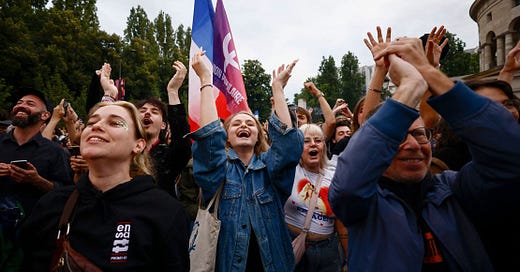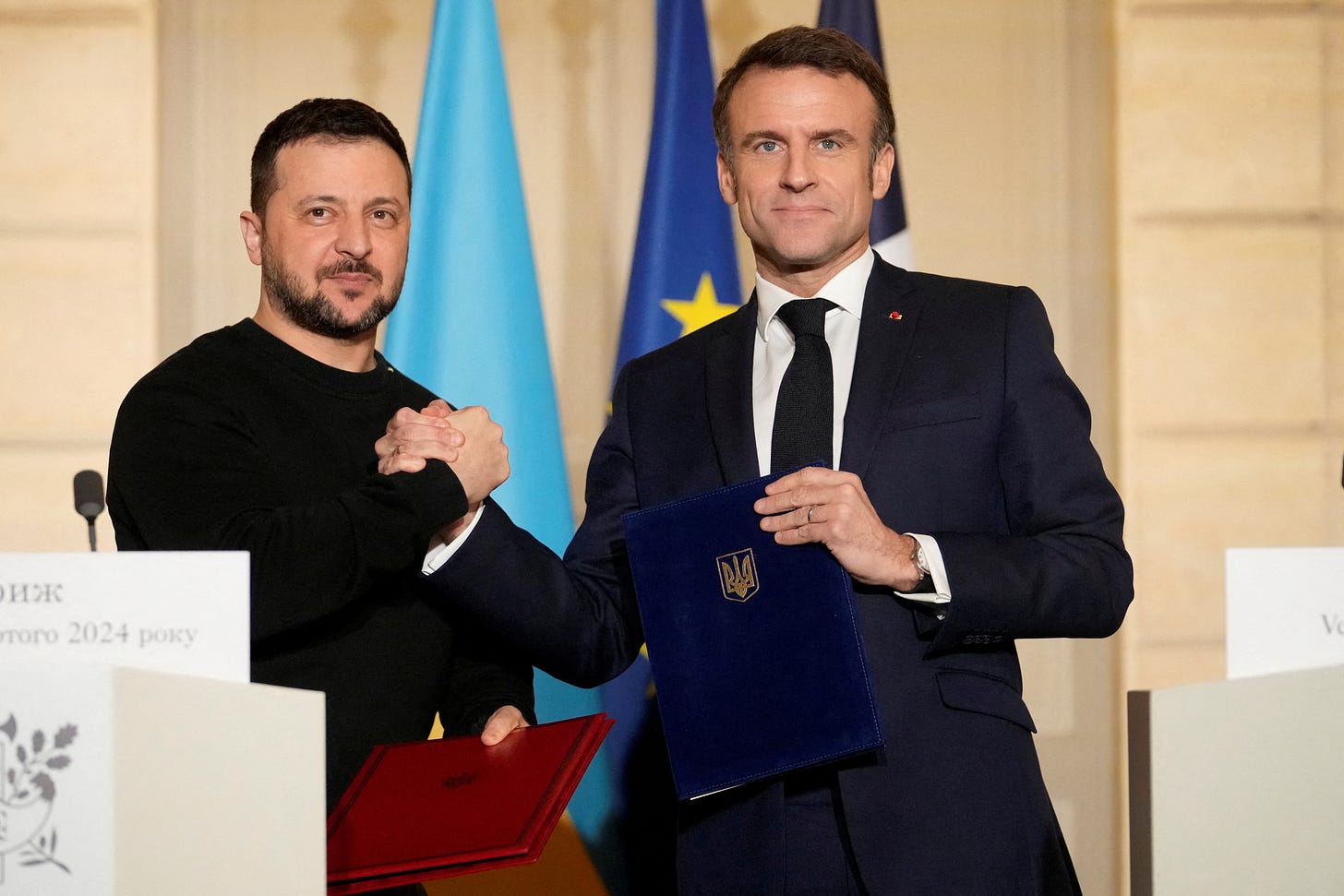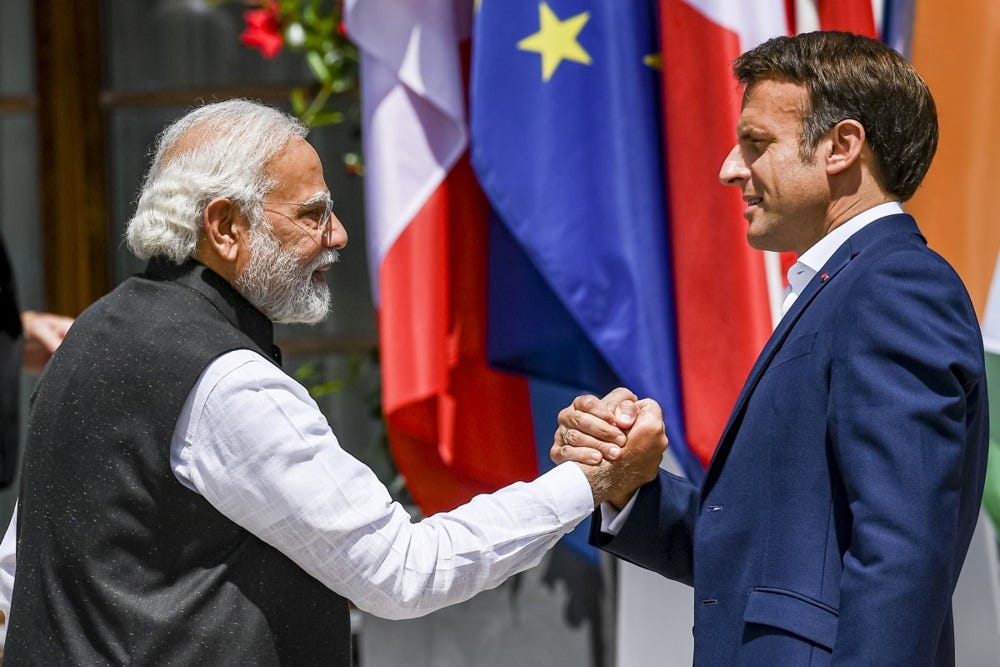French Left-Wing Coalition Beats Far-Right Favourites in Surprise Result
Stunning Outcome of France’s Snap Poll
In a dramatic turn of events, the French elections have yielded unexpected results, with the far-left New Popular Front (NFP) coalition outperforming projections and thwarting Marine Le Pen’s far-right National Rally (RN) party. The snap elections, called by President Emmanuel Macron, have led to a politically fragmented parliament, leaving France in a state of uncertainty.
The Rise of the Left-Wing Coalition
The NFP, a coalition of parties ranging from the far-left France Unbowed to the moderate Socialists and Ecologists, that was cobbled up in matter of days after the snap polls were announced by President Macron, is projected to win between 171 and 187 seats in the National Assembly. Despite leading in the first round, the RN failed to maintain its momentum, securing between 134 and 152 seats. The NFP's strong performance indicates a significant shift in voter sentiment towards progressive policies.
Macron's Ensemble Alliance Recovers
President Macron’s centrist Ensemble alliance, initially lagging in third place after the first round, recovered significantly to secure between 152 and 163 seats. This resurgence positions Ensemble as a crucial player in the new political landscape, despite not winning an outright majority.
Tactical Voting and Its Impact
The unexpected results can be attributed to tactical voting in the second round. Over 200 centrist and left-wing candidates withdrew from the race to avoid splitting the vote, effectively consolidating support against the far-right. This strategy played a pivotal role in ensuring the NFP's success and preventing the RN from gaining power. In other words, the leftist and centrist blocs effectively allied with each other to thwart the RN's bid to capture the French parliament.
The Far-Right's Setback
The RN’s initial strong showing in the first round had raised fears of France electing its first far-right government since World War II. However, the second-round results reflect a clear rejection of far-right ideologies by the French electorate. The far-right’s failure to secure a majority underscores the effectiveness of the "cordon sanitaire," a principle uniting left-wing and centrist parties to block the far-right from office, as delineated before.
Political Uncertainty and Cohabitation
With no party achieving an absolute majority, France faces a period of political uncertainty. President Macron may be forced into a rare cohabitation arrangement, appointing a prime minister from the NFP, despite previous refusals to coalition with France Unbowed leader Jean-Luc Mélenchon. This potential cohabitation could lead to a contentious and unstable legislative process.
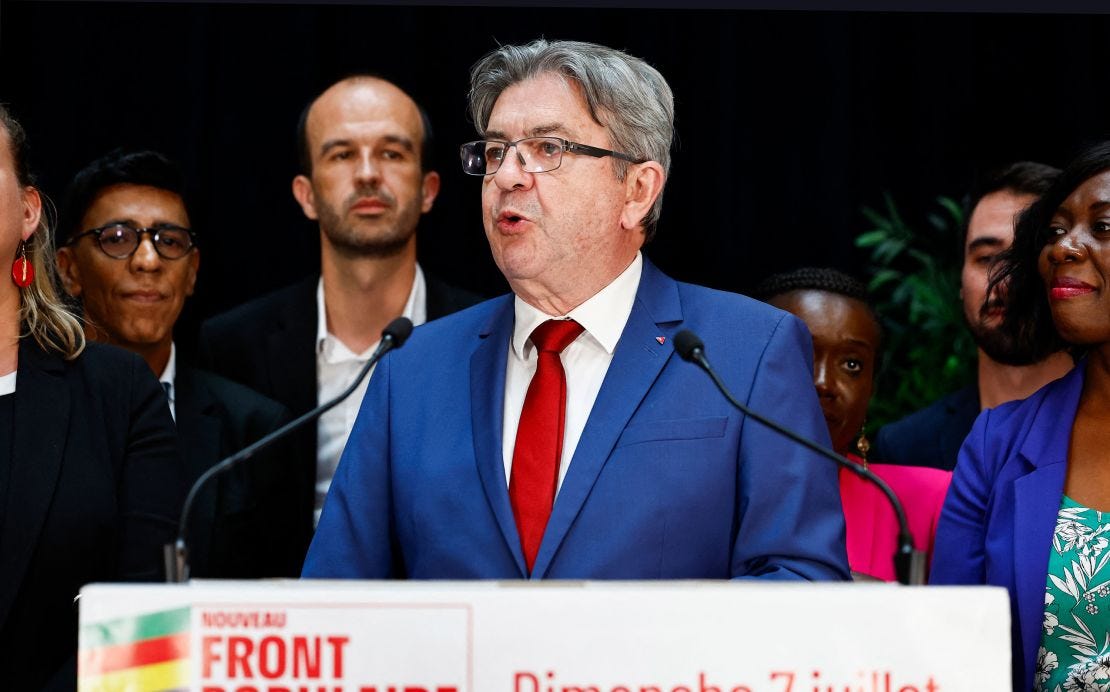
Next Prime Minister of France?
Based on the election results and the current political landscape in France, several potential candidates for Prime Minister have emerged: Jean-Luc Mélenchon, leader of La France Insoumise (LFI) and a key figure in the New Popular Front (NPF) coalition, initially seemed a strong contender but faces criticism for his confrontational style. Raphaël Glucksmann, who led a Socialist-backed coalition to a strong third-place finish in the European elections, has ruled himself out as a candidate but will likely influence the choice of nominee. Laurent Berger, former secretary general of the moderate CFDT union, is suggested as a compromise candidate due to his background in civil society and reputation as a unifying figure. François Ruffin, an LFI deputy with presidential ambitions, has support among activists but may face opposition from Mélenchon and LFI leadership.
Given the complex political situation and need for consensus-building, the NPF coalition may opt for a collegial approach with spokespersons from each party representing the coalition collectively. The final choice for Prime Minister will depend on negotiations within the NPF and potential discussions with other political groups to form a stable government, requiring someone who can bridge divides within the left and work with centrist forces in a fragmented parliament.
NPF's Victory and Domestic Policy Shifts in France
a.) Economic Policies
The New Popular Front's (NPF) victory is set to usher in more left-leaning economic policies, focusing on social welfare programs, higher minimum wages, and price controls on essential goods. The coalition's platform includes plans to raise the minimum wage and implement measures to support the working class, emphasizing a shift towards more equitable economic practices.
b.) Immigration Policies
On immigration, the NPF is expected to adopt a more inclusive and humanitarian approach. This includes improved reception conditions for asylum seekers, easier access to visas, and the introduction of a standard ten-year residence permit. The NPF also proposes creating a special status for climate refugees and repealing restrictive asylum and immigration laws from 2018 and 2024. This shift contrasts sharply with the previous administration's restrictive policies.
c.) Anti-Islamic Stance
The NPF's victory is likely to result in a strong stance against Islamophobia, with policies aimed at reducing discrimination against Muslims. This could include reconsidering or repealing restrictions on religious symbols, fostering dialogue between religious and cultural communities, and strengthening laws against hate speech and religious discrimination. The government may also promote more positive representations of Muslims in the media, aiming to create a more inclusive environment.
France's Likely Post-Election Foreign Policy Shift on Ukraine
Following the recent elections, France's stance on the Ukraine war and NATO is likely to become moderated from its current more assertive and strategically autonomous position. Under President Emmanuel Macron's leadership, France had been shifting from a diplomatic approach to a more hawkish foreign policy, emphasizing European strategic autonomy and advocating for Europe to support Ukraine independently of the United States, especially given concerns about a potential second Trump presidency. Macron had suggested that deploying Western troops to Ukraine should not be ruled out, unsettling some NATO allies but underscoring France's commitment to countering Russian aggression.
The elections highlighted the polarized French political landscape, with differing views on NATO. While some factions advocate for withdrawing from NATO's integrated military command, Macron's administration supports NATO and seeks to enhance European defense cooperation. Overall, France's commitment to supporting Ukraine is likely to continue with a modicum of moderation, promoting European security, and maintaining a robust stance against Russian aggression while navigating domestic and international complexities.
France-India Relations: Strategic Insights and Future Prospects
a.) Strategic Partnership: Defense and Trade Cooperation
France-India relations have significantly strengthened since the strategic partnership was established in 1998, with a notable focus on defense cooperation and trade. France has become India's second-largest arms supplier after Russia, with key deals including the 2016 contract for 36 Rafale fighter jets and the 2005 agreement for 6 Scorpene submarines. The partnership emphasizes co-designing, co-developing, and co-producing military hardware. Ongoing negotiations include acquiring 26 Rafale-M fighter jets for the Indian Navy and three additional Scorpene-class submarines, alongside potential collaboration on small modular reactors (SMRs) in the civil-nuclear sector. Recent initiatives include an ambitious defense industrial roadmap and an agreement between Tata Group and Airbus to produce H125 helicopters in India, highlighting the expanding scope of bilateral cooperation.
b.) Likely Changes Under the New Left-Leaning French Government
The new government may emphasize humanitarian and peacekeeping aspects of defense cooperation and scrutinize arms deals from an ethical standpoint. Trade policies may shift towards more inclusive economic models and social welfare initiatives, focusing on labor rights and fair trade practices. Additionally, there may be increased opportunities for collaboration between educational institutions, leading to more student visas and stronger cultural ties between France and India.
c.) In Summary
While the core of France-India relations is expected to remain robust, the new left-leaning French government may bring nuanced changes, particularly in defense priorities and trade practices. The strategic importance of the relationship suggests efforts will be made to navigate potential differences and maintain the positive trajectory of bilateral ties.
Summing Up
The unexpected defeat of the far-right and the rise of the left-wing coalition mark a point of inflection, if not a significant shift, in French politics. While the immediate threat of a far-right government has been averted, the fragmented parliament presents new challenges for governance and policy-making. As France navigates this new political terrain, the next steps taken by President Macron and the NFP will be crucial in shaping the country’s future. Nevertheless, as a key member of NATO and a supplier of sophisticated defense equipment to Ukraine, this major issue will remain at the centre of the agenda for the new government.
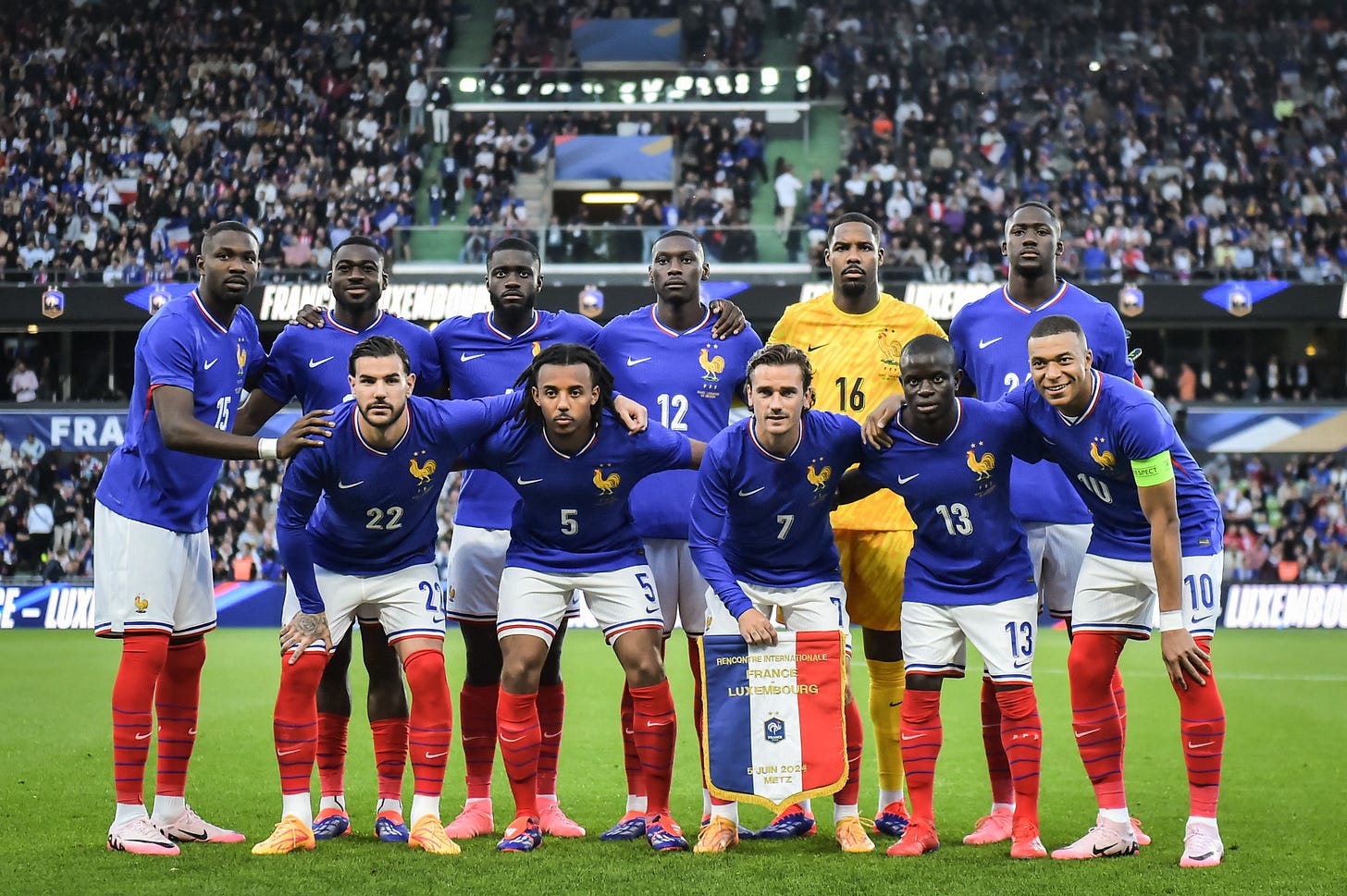
As the celebrations die down, the people of France may find unity in cheering their national football team in the UEFA Euro 2024 semi-finals: Semi-final 1 (July 9, 21:00 CEST/ July 10, 00:30 IST, Munich): Spain vs. France, overcoming political divides.
If you believe this article would interest someone you know, please feel free to share it anonymously (for us), using any platform that you prefer.

